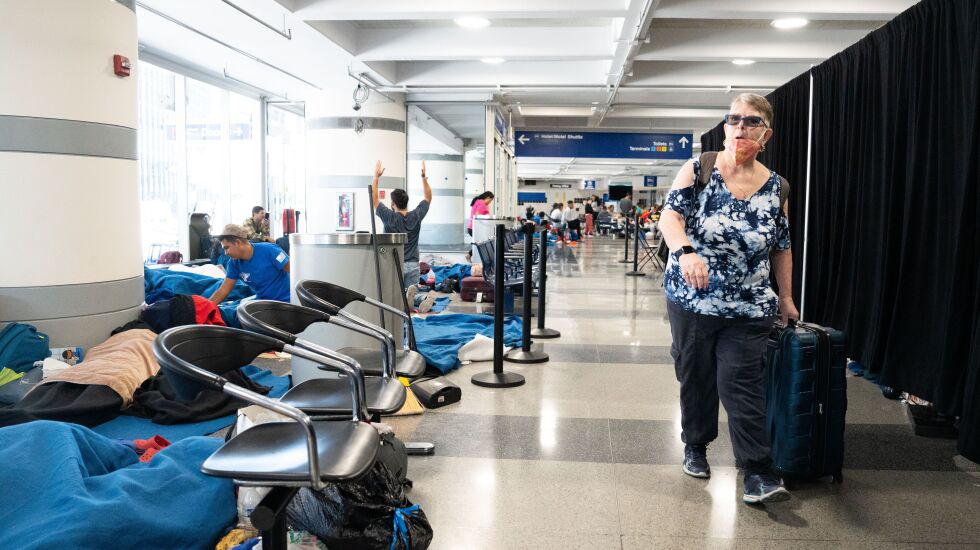
The City Council was advised Wednesday to develop a contingency plan to bankroll the migrant crisis and a long-term plan — with “additional stable revenue sources” — to support city employee pensions and sustain spending that ballooned during the pandemic.
The Civic Federation, one of Chicago’s oldest and most respected taxpayer watchdog groups, delivered its annual review of the city budget and it was a mixed bag for Mayor Brandon Johnson’s 2024 spending plan.
On the positive side of the ledger was the new mayor’s plan to hold the line on property taxes and his decision to make $306.6 million worth of “supplemental pension payments.”
Also cited were 400 new civilian positions in the Chicago Police Department and an “improvement to the city’s financial sustainability and debt ratings.”
But those positives must be weighed against serious concerns threatening to leave Chicago with a gaping mid-year budget gap.
The most immediate centers around Johnson’s decision to budget just $150 million for the migrant crisis in 2024, half of what’s needed and less than half of what the city is already spending.
Earlier this week, Budget Director Annette Guzman told the Sun-Times that without a major infusion of state and federal funding for the migrant crisis, Chicago may be forced to raid its reserve funds, endangering the city’s bond rating. A lower bond rating would increase the city’s borrowing costs.
During Council budget hearings, alderpersons also pressured the mayor’s budget team to identify “Plan B.”
The Civic Federation joined the chorus in an analysis of the mayor’s spending plan timed to coincide with the only public hearing on the mayor’s budget.
The pressing need for a back-up plan is particularly true after Gov. J.B. Pritzker and Illinois House Speaker Emanuel “Chris” Welch slammed the door on more migrant funding during the fall veto session.
Noting that the budget includes “half of the projected amount necessary to care for asylum seekers” the report states: “With such uncertainty regarding the number of migrants the City can expect over the next year, it will be essential to develop a contingency plan in the event that State and federal funds do not materialize.”
“It will also be necessary for the Mayor and Governor to continue to press the federal government to further intervene.”
The Civic Federation also sounded the alarm about Johnson’s decision to rely on the same one-time revenues Chicago mayors have used for decades to postpone the day of reckoning and avoid raising taxes.
They include declaring a record $434 million tax increment financing surplus; refinancing city bonds to generate $89.2 million; counting on “improved revenue projections to generate $186.8 million and “revenue enforcement collections” to add $35 million; and budgeting $41.5 million in unspecified “personnel savings,” presumably from not filling vacant positions.
Repeatedly relying on one-time sources indicates “a structural gap between revenues and expenditures. Therefore, there could be shortfalls in future budgets absent continued growth, additional resources or reductions to spending in future years,” the report states.
Impending police and fire pension sweeteners likely will exacerbate a pension crisis already gobbling up nearly 23% of net appropriations. Annual payments required to retire the mountain of city debt swallow another 17% of city spending.
Against that backdrop. a looming CTA funding cliff and continued concerns about the reliability of casino revenues, the Civic Federation argued it is more important than ever for the Council to identify new and sustainable sources of revenue to support increased spending during the pandemic.
Johnson has punted the revenue question to a subcommittee led by freshman Ald. William Hall (6th). Guzman told the Sun-Times she expects the options presented by that subcommittee to include broadening the sales tax to cover a host of professional services favored by the wealthy and business interests.
The idea has been talked about for decades, only to hit a dead-end in Springfield.
But, Guzman said, “We’re in a place now where people are more open to this idea. We’ve seen the dramatic shift in how people purchase things. It’s shifted more now toward services over goods. … Sometimes, it’s all about timing. … I look at it as a way of sharing the burden more equitably.”
Guzman was asked why Johnson abandoned the traditional playbook that advises mayors to lower the boom on taxpayers in the first budget after the election and hope voters forget about all of those tax increases by the time the next election rolls around.
“This mayor has shown that he is a collaborator at heart and at his core. He comes from an organizing background,” she said.
“Having more voices at the table about the best way to produce more revenue for the city ... is how he goes about bringing concensus.”







